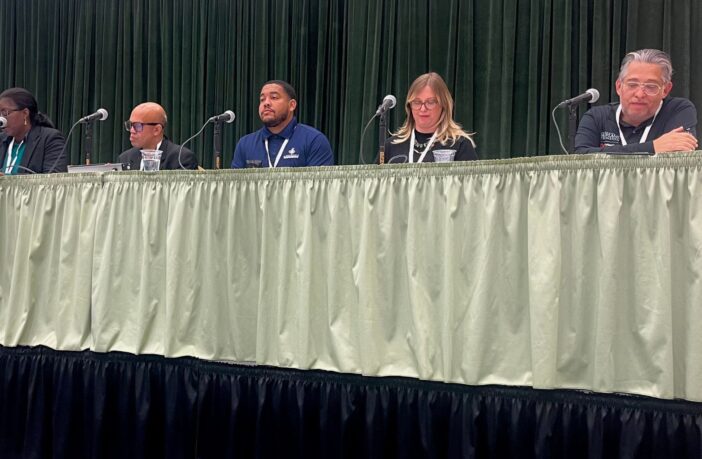By Megan Sayles
AFRO Business Writer
msayles@afro.com
Marylanders Online, a free statewide program working to close the digital divide, hosted the second annual Maryland Statewide Digital Equity Summit at the National Federation of the Blind in Baltimore on Oct. 15. The event convened digital inclusion leaders, experts and advocates from across the state to examine challenges, relay best practices and explore solutions to gaps in digital literacy and connectivity through a host of panel discussions.
Maryland Center for Computing Education director Quiana Bannerman, left; James Neal, senior program officer for the Institute of Museum and Library Services; Devin Jackson, founder of A Prosperous Tomorrow; Maria Barga, senior planet instructor and tech educator for University of Maryland Extension; and Gabriel Fumero, tech educator for University of Maryland Extension, explore successful training programs for digital skills.
Credit: AFRO Photo / Megan Sayles
In a video message for the summit, Maryland Governor Wes Moore conveyed his belief that Maryland has the potential to become a national model for digital inclusion and equity.
“We know that digital literacy is the key to economic progress, but a third of U.S. workers still lack fundamental digital skills and face significant barriers to digital inclusion, including here in Maryland. Recognizing this challenge our administration has been moving quickly,” said Moore. “We understand that digital inclusion is critical to health, education and economic opportunity, so this state is at the forefront of digital equity with others looking to us for leadership.”
Addressing Maryland’s Digital Equity Plan
In March 2024, Maryland released a roadmap for eliminating disparities in digital access, skills and affordability with the help of a $966,659 State Digital Equity Planning Grant from the National Telecommunications and Information Administration (NTIA).
The essential elements of the vision included household access to affordable, reliable internet, access to devices and the ability to maintain them, opportunities for mastering digital skills, guidance to stay safe online and state resources that are accessible online. The efforts are steered by principles, including inclusivity, equitable access, community engagement and collaboration, sustainability and evidence-based decision making.
The 278-page plan is not a final product though. The state is seeking engagement.
“It’s a working document, and we’re going to be updating it quarterly as we receive digital equity funding,” said Ronnie Hammond, director of Maryland’s Office of Statewide Broadband. “We can only do that from community feedback. We have a dedicated digital equity team and email to support comments on what’s working and what areas of opportunity we have.”
In July, the NTIA approved Maryland for $267.7 million in federal funding to support the Broadband Equity, Access and Deployment (BEAD) plan. Once the state creates the requisite infrastructure to ensure every Marylander has access to reliable, affordable high-speed internet, the rest of the money will be used for internet adoption, literacy training and workforce development programs.
The plan is currently undergoing a challenge process in which local government, internet service providers and nonprofits from across the state can evaluate the veracity of existing broadband maps. This way, the state can ensure the maps accurately reflect broadband availability and speeds to deliver funds where they are most needed.
Panelists pointed out that before the onslaught of the COVID-19 pandemic, which forced students to learn virtually and individuals to work remotely, little attention was given to digital equity and inclusion. Amy Huffman, policy director for the National Digital Inclusion Alliance, noted that she became the country’s first full-time digital inclusion and policy manager in 2019 while working for the state of North Carolina.
“I don’t say that to brag, but just to say that five years ago, there were no states that had these positions in their offices except for North Carolina,” said Huffman. “Today, flash-forward five years later, and every state has a digital equity person on staff in a broadband office or an adjacent office, working to elevate digital equity at the state level and to provide funding.”
“We have the most dollars in history going toward digital equity and broadband expansion. We have the biggest platform we’ve ever had,” she continued.
Prior to 2021, Maryland had the Office of Rural Broadband, which was established by former Governor Larry Hogan in 2017 to provide high-speed internet access to the more rural parts of the state. With support from local jurisdictions, it was later reestablished as the Office of Statewide Broadband.
“It not only put a focus on deployment, but also digital equity,” said Hammond. “For us, it’s not deployment versus equity, it’s equity in deployment.”
Best practices for creating regional digital equity plans
As the pandemic shone a light on the stark digital divide across the state, leaders and organizations raced to provide resources to support the transition to remote work and learning. Samanatha Musgrave, interim executive director of the Baltimore Digital Equity Coalition, said localities could evaluate the efficacy of these efforts to inform their own digital equity strategies.
“We can look at some of the work that was born out of early phase COVID-19 in terms of access to hotspots, access to internet services that are affordable and device access, and we can decide what was effective and what’s not working so well,” said Musgrave. “I’m very interested in learning more about how ‘big Chromebook’ has benefited from the pandemic, and I don’t use that term lightly. We are on the cusp of thinking about what’s next for useful device access.”
One warning that several panelists gave when forming a digital equity plan is to refrain from dictating what individuals need without seeking their input. William Honablew Jr., digital equity coordinator for the city of Baltimore, said some leaders believe they already know what a community requires and fail to give them the power to voice their concerns.
“One of the things that I’ve learned in the planning process is that it’s very easy for us to go into communities as colonizers. It is very easy for us to show up and say, ‘Hey, you guys need broadband. We’re going to give you all the broadband you need,’” said Honablew. “It is much more difficult to shut up, sit down and listen to the people you’re trying to help.”
Individuals may encounter challenges that digital equity professionals have never thought of. By hearing them out and taking their grievances seriously a plan becomes much more comprehensive.
Across the U.S., more than 20 million households benefited from the Federal Communications Commission’s Affordable Connectivity Program, which provided discounts for internet service and devices. Unfortunately, the program closed on June 1 due to a lack of funding from Congress.
Though there have been widespread campaigns to refund the program, Musgrave said the state of Maryland should take it upon itself to plan for a new subsidy program to make connectivity more affordable.
She also emphasized the importance of acknowledging the reason behind the digital divide when drafting strategies.
“We are responsible for describing these problems for what they are, which is systemic racism in many ways and historic, intentional disinvestment in communities that greatly deserve and need access to resources that have been denied from them,” said Musgrave. “We need to take our own role and responsibility in solving those problems from our own perspectives.”
Developing successful models for digital skills training
Having internet access does not mean a person knows how to use the internet or devices that come with it, especially for certain segments of communities like older adults, returning citizens and individuals with disabilities. With so many critical services online, people must know how to navigate technology to benefit from it.
“As our world becomes increasingly digital, the importance of digital skills cannot be overstated,” said Quiana Bannerman, director of the Maryland Center for Computing Education. “From basic computer literacy to advanced programming and data analysis, digital skills are essential for individuals and organizations to thrive in today’s economy.”
One crucial component in establishing training programs is thinking outside the box. Devin Jackson, founder of A Prosperous Tomorrow, said there are no cookie-cutter solutions to teaching people digital skills as everyone’s needs are different.
“I believe there should be custom-tailored solutions for those participants who are actually coming to the skills training you’re providing,” said Jackson. “When you look around the room, all of us are different. Oftentimes, we develop programming for everyone to be inclusive, but we also don’t account for those differences.”
His nonprofit organization, based in Baltimore, conducts community assessments to understand needs and challenges on an individual level. Rather than pick a starting and end point for everyone, Jackson said the curriculum should be flexible to suit each person’s proficiency.
To help inform curriculum development, panelists recommended using the National Skills Coalition as a resource. One of the organization’s focus areas is examining how the knowledge of digital skills leads to different outcomes as far as workforce and economic development. They also suggested leveraging the Institute of Museum and Library Services’ (IMLS) resources for information literacy.
“IMLS comes from the premise that libraries are interested in basic literacy, the ability to read and write. From that component, there are many other areas in which you may move. Digital literacy is one, but there’s also financial literacy, health literacy and civic literacy,” said James Neal, senior program officer for IMLS. “You have to be willing to learn, unlearn and relearn. That’s the only way you’re going to move ahead in the 21st century.”
This story is part of the Digital Equity Local Voices Fellowship lab. The lab initiative is made possible with support from Comcast NBC Universal.



